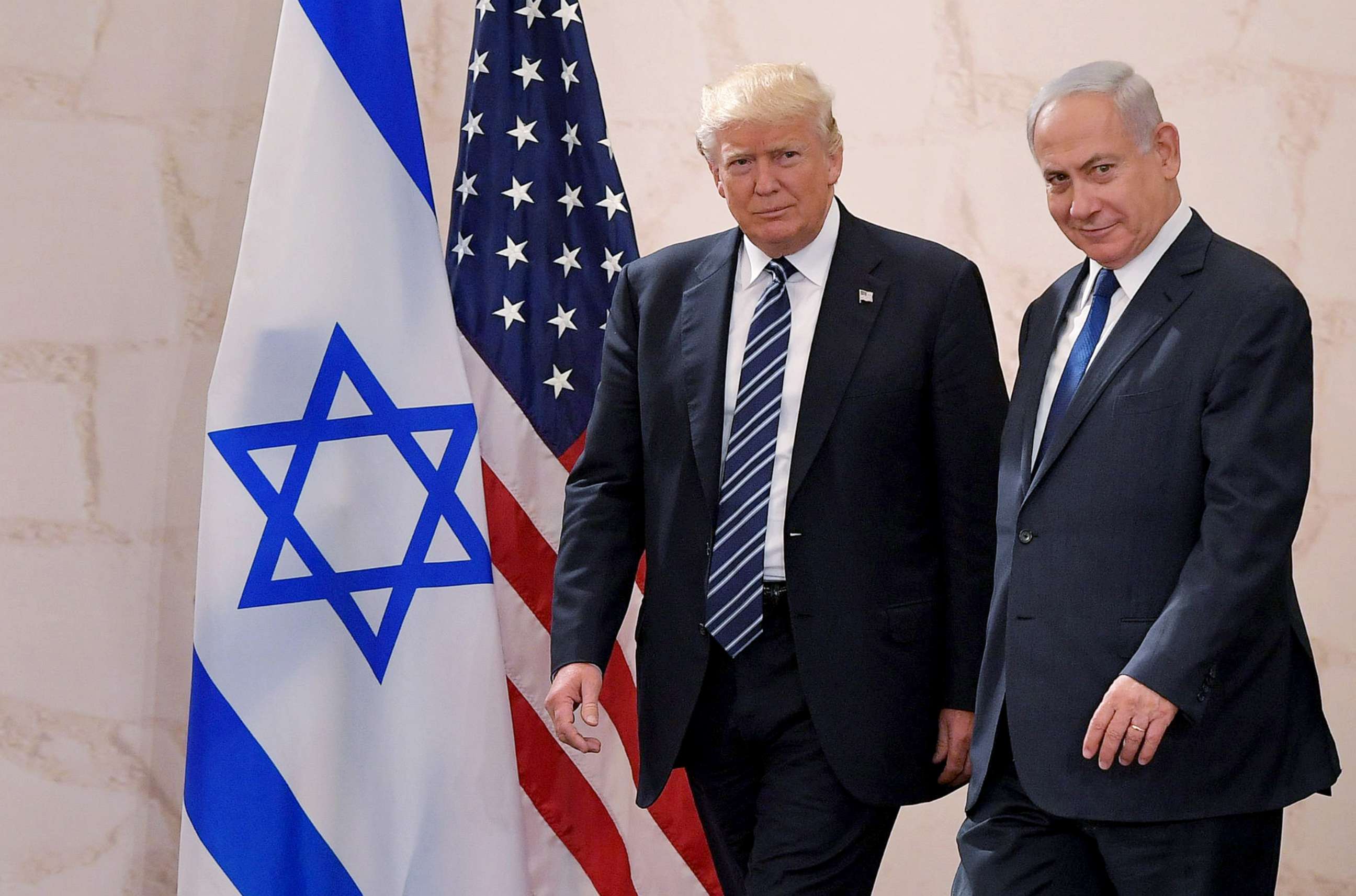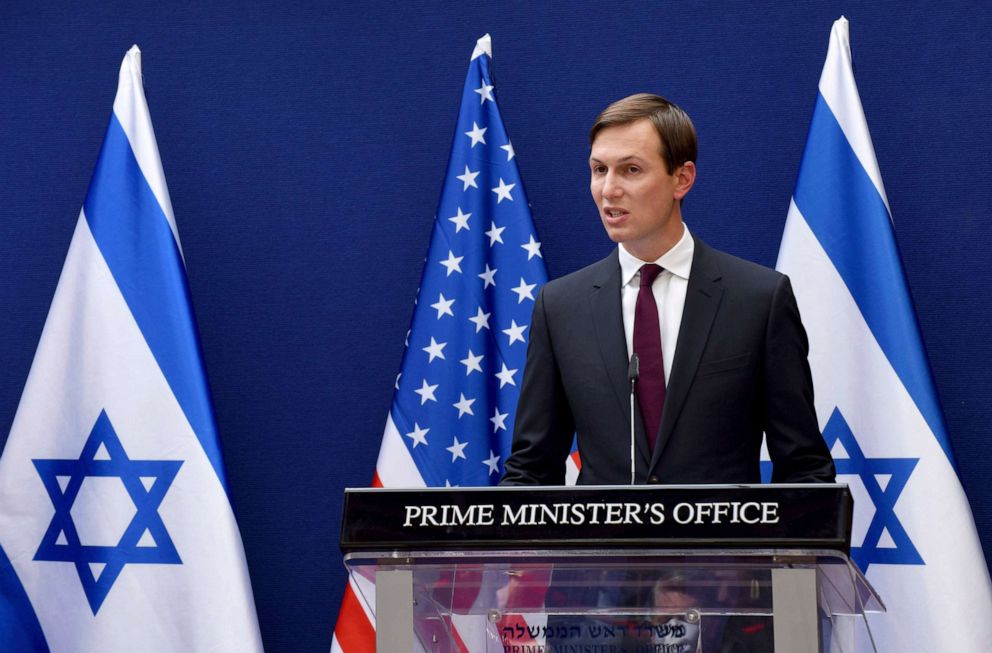Trump to play global dealmaker with Israel and 2 Arab countries
The signings give the president a foreign policy achievement ahead of election.
President Donald Trump on Tuesday will play the role of diplomat and dealmaker as he hosts Israel, the United Arab Emirates and Bahrain for two signing ceremonies in which the Arab nations will agree to establish full diplomatic relations with the Jewish state.
The UAE and Bahrain will become just the third and fourth Arab countries to enter into full relations with Israel and the decision to do so represents the shifting dynamics in the region by further solidifying Israel's position within the region, chipping away at the Arab consensus and countering Iran's might.
But missing from the ceremony will be leaders of the Palestinian people, whose decades-long conflict with Israel Trump has failed to solve, despite trying.
For all the significance, former Middle East peace negotiator Dennis Ross said it is apples-to-oranges to compare Tuesday's signings to Israel's two prior historic agreements with Jordan and Egypt.
"Those were countries that fought wars with Israel. These are not countries that have fought wars with Israel, these are countries that don't have a common border with Israel and have never taken part in past conflicts," Ross, who served as a senior adviser to former President Barack Obama said.
Ross described Tuesday's signings as a "psychological breakthrough" and noted that work of setting the details for engagement going forward remains to be done.
"What's going to be signed at the White House is not going to be a full-fledged peace treaty, (though) they're going to call it that, because the Israelis and Emirates still have to negotiate all the details. So that's why this is much more of a symbolic event," he said.

The president's son-in-law and adviser Jared Kushner, who has played a leading role in the administration's Middle East efforts, acknowledged as much on a call with reporters Friday but touted the agreements as a "culmination of four years of great work that the president and this administration has carefully executed."
"With regards to the details -- again, there has not been a lot of interaction between Israel and Bahrain, and we've been able to broker this breakthrough at the leadership level. And now people will get together on the working levels to get to know each other, to start talking through some of the opportunities," Kushner said.
The president announced that the U.S. had helped to strike a deal between Israel and UAE and Israel last month, and less than 30 days later, announced that Bahrain would also sign an agreement with Israel.
Coming less than two months before Election Day, Tuesday's ceremony will be an opportunity for Trump to showcase a foreign policy achievement as he seeks a second term in the White House.
The White House expects several hundred attendees at a ceremony where Israel will sign documents with each Arab nation, with the UAE's longer since the nations have had more time to negotiate, according to a senior Trump administration official. Bilateral meetings will precede the signings, and a lunch attended by all three nations and the U.S. will follow, the official said.
"There's also going to be sort of something that everybody is signing," another document that would be referred to as the "Abraham Accords," according to the official, who would not give more details.
"A large amount" of "senior Democrats" were invited to the ceremony, the official said, a rarity for an event at Trump's White House.
But for all appearances of a fast-tracked diplomatic breakthrough, Ross said this was not an "overnight transformation" and has been in the making for the last decade.
It was a sentiment echoed by Jon Alterman, the director of the Middle East Program at the Center for Strategic and International Studies, who said Tuesday's signings are the culmination of years of patient diplomacy.
"This started under the Obama administration, this is not a sudden realization, the Israelis have been extremely focused on this," Alterman said.
"In many ways this is a vindication of precisely the kind of traditional diplomacy the Trump administration hasn't been interested in. The Emiratis were interested in pursuing this, the Israelis were interested in pursuing it. And over the course of months and years through slow confidence building and small incentives by the United States are able to do this," he said.
But in moving forward with a deal now, ahead of the election, Alterman said the Emirates have found themselves "in the driver's seat" and reasoned they have been able to extract useful concessions and sweeteners in the course of shaking hands with the U.S. and Israel.
"If you're the Emirates and you're -- and you're looking at when is your moment to get something, why not lock in something with the Trump administration, get something when the Israelis are really keen to lock in here, and then continue to negotiate going forward. Why wouldn't you do it that way?" Alterman said.

The UAE has sought the sale of advanced F-35 fighter jets from the United States, part of negotiations not initially disclosed by the U.S. and a worry for Israel, which maintains air superiority in the region.
"The administration really wants the deal, because they're concerned about politics. The Israelis really want the deal. So give them what they really want to get what you want and then continue to negotiate to get more," Alterman said.
While the deals represent a win for the parties involved, it comes as a loss to the Palestinians, who view the deal by Arab nations to engage with Israel as a betrayal to the cause of Palestinian statehood.
"It sends a message to the Palestinians that other countries in the region, they're going to put their own national interests first, not that they don't care about Palestinians, but they're gonna put their national interests first," Ross said.
While President Trump's hopes to achieve what he has coined as the "ultimate deal" in the form of an Israeli-Palestinian peace agreement remains a distant prospect, Kushner went so far as to contend that the new agreement "signals the end, we believe, of the Arab-Israeli conflict" in an interview on ABC's "Good Morning America" on Tuesday.
"There's still a lot more work to do but for 70 years in the region you've had the Arab countries not wanting to interact with Israel in a substantive way," Kushner said, making the case that the engagement represents a new chance for peace in the region.
"It is not the end of the conflict between the Israeli and the Palestinians. The Palestinians are calling this a betrayal. Are their hopes for a state now dead?" ABC News' Chief anchor George Stephanopoulos followed up.
"No, look, I think there is a lot of posture. In deals, everyone is at no until there's a yes. I think what you're seeing is tremendous movement. They were caught by surprise by this. The Arab countries want to focus on their citizens and want them to have better lives and are tired of waiting for the Palestinians to not be practical and make a deal. President Trump is a dealmaker," Kushner responded. "At some point when they decide they want to live better lives I believe they'll engage."
This report was featured in the Tuesday, Sept. 15, 2020, episode of “Start Here,” ABC News’ daily news podcast.
"Start Here" offers a straightforward look at the day's top stories in 20 minutes. Listen for free every weekday on Apple Podcasts, Google Podcasts, Spotify, the ABC News app or wherever you get your podcasts.